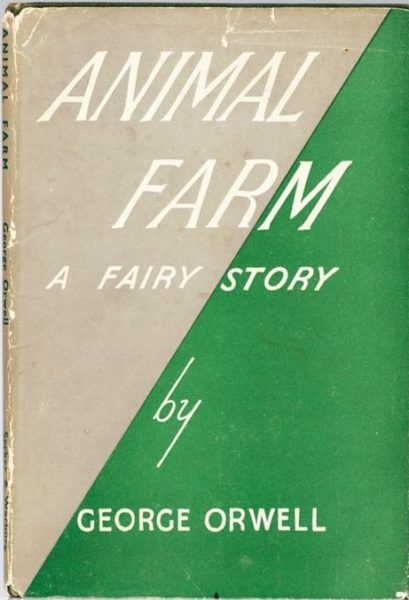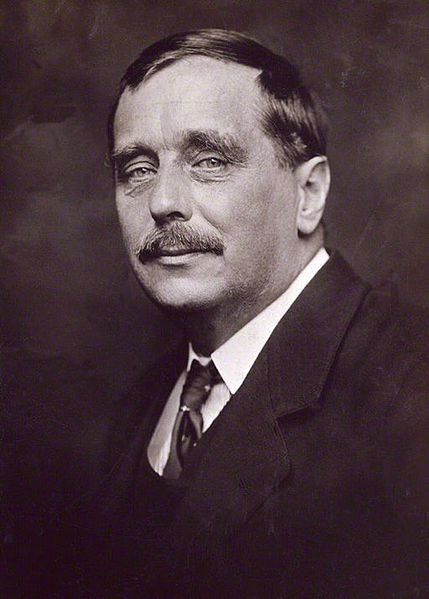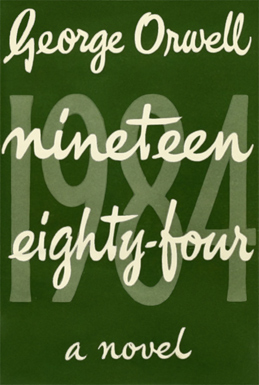This demands a continuous alteration of the past, made possible by the system of thought which really embraces all the rest, and which is known in Newspeak as DOUBLETHINK.
The alteration of the past is necessary for two reasons, one of which is subsidiary and, so to speak, precautionary. The subsidiary reason is that the Party member, like the proletarian, tolerates present-day conditions partly because he has no standards of comparison … This day-to-day falsification of the past, carried out by the Ministry of Truth, is as necessary to the stability of the regime as the work of repression and espionage carried out by the Ministry of Love.
The mutability of the past is the central tenet of Ingsoc. Past events, it is argued, have no objective existence, but survive only in written records and in human memories. The past is whatever the records and the memories agree upon. And since the Party is in full control of all records and in equally full control of the minds of its members, it follows that the past is whatever the Party chooses to make it. It also follows that though the past is alterable, it never has been altered in any specific instance. For when it has been recreated in whatever shape is needed at the moment, then this new version IS the past, and no different past can ever have existed … It is also necessary to REMEMBER that events happened in the desired manner. And if it is necessary to rearrange one’s memories or to tamper with written records, then it is necessary to FORGET that one has done so. The trick of doing this can be learned like any other mental technique. It is learned by the majority of Party members, and certainly by all who are intelligent as well as orthodox. In Oldspeak it is called, quite frankly, “reality control”. In Newspeak it is called DOUBLETHINK.
George Orwell, Nineteen Eighty-Four, 1949.
May 4, 2021
QotD: DOUBLETHINK
April 28, 2021
QotD: George Orwell’s other novels
[Orwell’s] major work remains canonical, and cited on a daily basis in virtually every context imaginable, appropriately or otherwise. It seems unlikely that virtually any well-read man or woman is a stranger to his two most famous novels, which have established him, even seven decades after his death, as one of the bestselling writers in the English language. But once-popular works such as The Road to Wigan Pier are now in danger of falling into obsolescence, as the social circumstances that Orwell describes seem less and less relevant to a 21st-century readership, and even his great work of Spanish Civil War reportage Homage to Catalonia might be dismissed as a period piece, written with undeniable fire and conviction but saying little to a contemporary audience.
This would be a harsh and rather glib judgement, but many writers have faced worse. The book that suggested Wigan Pier, JB Priestley’s English Journey, was once hugely influential, even being credited with winning Labour the 1945 election, and is now regarded as a quaint piece of social commentary. That Priestley conducted his travels from a chauffeur-driven car, while Orwell willingly subjected himself to filthy evenings in slum bed and breakfasts and hostels, is a telling distinction between the two writers and their approaches: it is also undeniably true that Priestley died at 89, a grand old man of letters, and that Orwell’s premature death was one brought on by the tuberculosis that had affected him for years before his death. Yet Priestley is now remembered mainly for An Inspector Calls, and Orwell remains an iconic figure, beloved by millions. His canonisation was made explicit by a statue of him by Martin Jennings being erected outside Broadcasting House in 2017, complete with the phrase “If liberty means anything at all, it means the right to tell people what they do not want to hear”.
Yet it is doubtful that many of his admirers have read his earlier novels, namely Burmese Days, A Clergyman’s Daughter, Keep the Aspidistra Flying and Coming Up For Air. All four were brought out by the left-wing publisher Victor Gollancz, between 1934 and 1939, and each of them is autobiographical in nature. Burmese Days draws on Orwell’s faintly unlikely time in Burma in the Twenties with the Indian Imperial Police, and A Clergyman’s Daughter uses both his life with his family in Southwold (which appears faintly disguised in the novel as “Knype Hill”) and his days tramping for its narrative. Keep the Aspidistra Flying finds Orwell mining his experiences in the lower reaches of the London literary scene, including his time working in a bookshop in Hampstead, and Coming Up For Air, written while Orwell was recuperating in Marrakesh, is suffused with an intense nostalgia for an England that may never have really existed, but is of a piece with the fascination, and repulsion, for the tenets of “Englishness” that Orwell wrote about over and over again in his essays and reportage.
Alexander Larman, “The lesser-known Orwell: are his novels deserving of reappraisal?”, The Critic, 2021-01-07.
April 14, 2021
QotD: Emmanuel Goldstein, the Enemy of the People
The programmes of the Two Minutes Hate varied from day to day, but there was none in which Goldstein was not the principal figure … Somewhere or other he was still alive and hatching his conspiracies: perhaps somewhere beyond the sea, under the protection of his foreign paymasters, perhaps even — so it was occasionally rumoured — in some hiding-place in Oceania itself …
Goldstein was delivering his usual venomous attack upon the doctrines of the Party — an attack so exaggerated and perverse that a child should have been able to see through it, and yet just plausible enough to fill one with an alarmed feeling that other people, less level-headed than oneself, might be taken in by it …
The sight or even the thought of Goldstein produced fear and anger automatically … But what was strange was that although Goldstein was hated and despised by everybody, although every day and a thousand times a day, on platforms, on the telescreen, in newspapers, in books, his theories were refuted, smashed, ridiculed, held up to the general gaze for the pitiful rubbish that they were — in spite of all this, his influence never seemed to grow less. Always there were fresh dupes waiting to be seduced by him. A day never passed when spies and saboteurs acting under his directions were not unmasked by the Thought Police.
George Orwell, Nineteen Eighty-Four, 1949.
February 10, 2021
Victor Davis Hanson on Animal Farm, America’s nightmare 2021 version
Victor Davis Hanson outlines the original George Orwell novel and then contrasts today’s situation with what progressives demanded back in the 1960s and 70s:
Yes, the downtrodden pigs, the exploited horses, and the victimized sheep finally did expel Farmer Jones from America’s Animal Farm.
But in his place, as Orwell predicted, revolutionary pigs began walking on two feet and absorbed all the levers of American cultural influence and power: the media, the bureaucracies, Wall Street, Silicon Valley, publishing, the academy, K-12 education, professional sports, and entertainment. And to them all, the revolutionaries added their past coarseness and 1960s-era by-any-means-necessary absolutism.
We are now finally witnessing the logical fruition of their radical utopia: Censorship, electronic surveillance, internal spying, monopolies, cartels, conspiracy theories, weaponization of the intelligence agencies, pouring billions of dollars into campaigns, changing voting laws by fiat, a woke revolutionary military, book banning, bleeding the First Amendment, canceling careers, blacklisting, separate-but-equal racial segregation and separatism.
Conspiracies? Now they brag of them in Time. Read their hubristic confessionals in “The Secret History of the Shadow Campaign That Saved the 2020 Election.” Once upon a Time, radicals used to talk of a “secret history” in terms of the Pentagon Papers, or a “shadow campaign” in detailing Hollywood blacklisting. They are exactly what they once despised, with one key qualifier: Sixties crudity and venom are central to their metamorphosis.
Our left-wing American revolutionary cycle from the barricades to the boardroom was pretty quick — in the manner that the ideology of the Battleship Potemkin soon led to Stalin’s show trials, or Mao’s “long march” logically resulted in the Cultural Revolution. The credo, again, is that the noble ends of forced “equity” require any means necessary to achieve them.
The Left censors books in our schools, whether To Kill a Mockingbird or Tom Sawyer. It is the Left who organizes efforts to shout down campus speakers or even allows them to be roughed up.
The Left demands not free-speech areas anymore, but no-speech “safe spaces” and “theme houses” — euphemisms for racially segregated, “separate-but-equal” zones. “Microaggressions” are tantamount to thought crimes. The mere way we look, smile, or blink can indict us as counterrevolutionaries. Stalin’s Trotskyization of all incorrect names, statues, and commemoratives is the Left’s ideal, as they seek to relabel Old America in one fell swoop. No one is spared from the new racists, not Honest Abe, not Tom Jefferson, not you, not me.
For “teach-ins,” we now have indoctrination sessions. But the handlers are no longer long-haired 1960’s dreamy, sloppy, and incoherent mentors. They are disciplined, no-nonsense brain-washers.
The Left’s Russia is our new old bogeyman. Putin is the new “We will bury you” Khrushchev.
January 19, 2021
QotD: British foods
… it is worth listing the foodstuffs, natural or prepared, which are especially good in Britain and which any foreign visitor should make sure of sampling.
First of all, British apples, one or other variety of which is obtainable for about seven months of the year. Nearly all British fruits and vegetables have a good natural flavour, but the apples are outstanding. The best are those that ripen late, from September onwards, and one should not be put off by the feat that most British varieties are dull in colour and irregular in size. The best are the Cox’s Orange pippin, the Blenheim Orange, the Charles Hoss, the James Grieve and the Russet. These are all eaten raw. The Bramley Seedling is a superlative cooking apple.
Secondly, salt fish, especially kippers and Scottish haddocks. Thirdly, oysters – very large and good, though artificially expensive. Fourthly, biscuits, both sweetened and unsweetened, especially those that come from the four or five great firms whose names are a trademark. Fifthly, jams and jellies of all kinds. These are usually best when home-made, with the exception of strawberry jam, which is nearly always better as a manufactured product. Some varieties not often seen outside Britain are blackcurrant jelly, bramble jelly (made of blackberries) marrow jam with ginger, and damson cheese, an especially stiff kind of jelly which can be cut in slabs. In addition, no one who has not sampled Devonshire cream, Stilton cheese, crumpets, potato cakes, saffron buns, Dublin prawns, apple dumplings, pickled walnuts, steak-and-kidney pudding and, of course, roast sirloin of beef with Yorkshire pudding, roast potatoes and horseradish sauce, can be said to have given British cookery a fair trial.
The only alcoholic drinks which are native to Britain, and are all widely drunk, are beer, cider and whiskey. The cider is fairly good (that brewed in Herefordshire is the best), the beer very good. It is somewhat more alcoholic and very much bitterer then the beers of most other countries, all save the mildest and cheapest kinds being strongly flavoured with hop. Its flavour varies greatly from one part of the country to another. The whiskey exported from Britain is mostly Scottish, but the Irish kind, which is sweeter in taste and contains more rye, is also popular in Britain itself. One excellent liquor, sloe gin, is widely made in Britain, though not often exported. It is always better when home-made. It is of a beautiful purplish-red colour, and rather resembles cherry brandy, but is of a more delicate flavour.
Finally, a word in praise of British bread. In general it is close-grained, rather sweet-flavoured bread, which remains good for three or four days after being baked. It is seen at its best in the kind of double loaf. Rye bread and barley bread are hardly eaten in Britain, but the wholemeal wheat bread is extremely good. The great virtue of British bread is that it is baked in small batches, in a rather primitive way, and therefore is not at all standardised. The bread from one baker may be quite different from another down the street, and one can range about from shop to shop until one is suited. It is a good general rule that small, old-fashioned shops make the best-flavoured bread. Throughout a great deal of the North of England the women prefer to bake their bread for themselves.
George Orwell, “British Cookery”, 1946. (Originally commissioned by the British Council, but refused by them and later published in abbreviated form.)
December 26, 2020
QotD: British meals – fish, fowl, and vegetables
There are not many methods of cooking birds which are peculiar to Britain. The British regard as inedible many birds – for instance, thrushes, larks, sparrows, curlews, green plovers and various kinds of duck – which are valued in other countries. They are also inclined to despise rabbits, and rabbit-rearing for the table has never been extensively practiced in Britain. On the other hand they will eat young rooks, which are shot in May and baked in pies. They are especially attached to geese and turkeys, which (at normal times) are eaten in immense quantities at Christmas, always roasted whole, with chestnut stuffing in the case of turkeys, and sage and onion stuffing and apple sauce in the case of geese.
Fish in Britain is seldom well cooked. The sea all round Britain yields a variety of excellent fishes, but as a rule they are unimaginatively boiled or fried, and the art of seasoning them in the cooking is not understood. The fish fried in oil to which the British working classes are especially addicted is definitely nasty, and has been an enemy of home cookery, since it can be bought everywhere in the big towns, ready cooked and at low prices. Except for trout, salmon and eels, British people will not eat fresh-water fish. As for vegetables, it must be admitted that, potatoes apart, they seldom get the treatment they deserve. Thanks to the rain-soaked soil, British vegetables are nearly all of excellent flavour, but they are commonly spoiled in the cooking. Cabbage is simply boiled – a method which renders it almost uneatable – while cauliflowers, leeks and marrows are usually smothered in a tasteless white sauce which is probably the “one sauce” scornfully referred to by Voltaire. The British are not great eaters of salads, though they have grown somewhat fonder of raw vegetables during the war years, thanks to the educational campaigns of the Ministry of Food. Except for salads, vegetables are always eaten with the meat, not separately.
George Orwell, “British Cookery”, 1946. (Originally commissioned by the British Council, but refused by them and later published in abbreviated form.)
November 11, 2020
QotD: Appeasement and shifting allegiances between the wars
Although it was in every way more pardonable, the attitude of the Left towards the Russian régime has been distinctly similar to the attitude of the Tories towards Fascism. There has been the same tendency to excuse almost anything “because they’re on our side”. It is all very well to talk about Lady Chamberlain photographed shaking hands with Mussolini; the photograph of Stalin shaking hands with Ribbentrop is much more recent. On the whole, the intellectuals of the Left defended the Russo-German Pact. It was “realistic”, like Chamberlain’s appeasement policy, and with similar consequences. If there is a way out of the moral pigsty we are living in, the first step towards it is probably to grasp that “realism” does not pay, and that to sell out your friends and sit rubbing your hands while they are destroyed is not the last word in political wisdom.
George Orwell, “Who are the War Criminals?”, Tribune, 1943-10-22.
September 29, 2020
Modern Classics Summarized: 1984
Overly Sarcastic Productions
Published 24 Feb 2017It’s the mother of all dystopias! Long before YA dystopia rose to power, before the age of Young Attractive Heroes who Rebel Against The State and Also Find Love, there was just Winston Smith — a middle-aged man in poor health who Rebelled Against The State and Also Found Love. It just ended much less prettily for him.
1984 codified most of the modern dystopia tropes — absolute control of the media, black-bagging people who spoke out, and a lot of popular terms like “doublethink”, “big brother”, and “thought police”. Unfortunately, a lot of those terms got stripped of context and thrown around for the sake of Extra Edge, and as a result they get used a little haphazardly. And there’s nothing Red hates more than misused terminology, so here’s the video outlining the ORIGINAL meaning of 1984!
PATREON: www.patreon.com/user?u=4664797
MERCH LINKS:
Shirts – https://overlysarcasticproducts.threa…
All the other stuff – http://www.cafepress.com/OverlySarcas…Find us on Twitter @OSPYouTube!
August 17, 2020
QotD: Orwell and faith
I spent a day with Orwell just before he died. I sat on his sanatorium bed, tried to smoke the frightful cigarettes he insisted on making for himself. I heard him say: “The problem of the world is this: Can we get men to behave decently to each other if they no longer believe in God?”
Charles Curran, “Orwell: The man behind 1984 — and all that”, Daily Mirror, 1954-12-14.
August 11, 2020
August 7, 2020
August 1, 2020
QotD: Voluntary self-censorship
Obviously it is not desirable that a Government department should have any power of censorship (except security censorship, which no one objects to in wartime) over books which are not officially sponsored. But the chief danger to freedom of thought and speech at this moment is not the direct interference of the M.O.I. [Ministry of Information] or any official body. If publishers and editors exert themselves to keep certain topics out of print, it is not because they are frightened of prosecution but because they are frightened of public opinion. In this country, intellectual cowardice is the worst enemy a writer or journalist has to face, and that fact does not seem to me to have had the discussion it deserves.
Any fair‐minded person with journalistic experience will admit that during this war official censorship has not been particularly irksome. We have not been subjected to the kind of totalitarian “co-ordination” that it might have been reasonable to expect. The press has some justified grievances, but on the whole the Government has behaved well and and has been surprisingly tolerant of minority opinions. The sinister fact about literary censorship in England is that it is largely voluntary. Unpopular ideas can be silenced, and inconvenient facts kept dark, without the need for any official ban. Anyone who has lived long in a foreign country will know of instances of sensational items of news — things which on their own merits would get the big headlines — being kept right out of the British press, not because the Government intervened but because of a general tacit agreement that “it wouldn’t do” to mention that particular fact. So far as the daily newspapers go, this is easy to understand. The British press is extremely centralized, and most of it is owned by wealthy men who have every motive to be dishonest on certain important topics. But the same kind of veiled censorship also operates in books and periodicals, as well as in plays, films and radio. At any given moment there is an orthodoxy, a body of ideas which it is assumed that all right thinking people will accept without question. It not exactly forbidden to say this, that or the other but it is “not done” to say it, just as in mid‐Victorian times it was “not done” to mention trousers in the presence of a lady. Anyone who challenges the prevailing orthodoxy finds himself silenced with surprising effectiveness. A genuinely unfashionable opinion is almost never given a fair hearing, either in the popular press or in the highbrow periodicals.
At this moment what is demanded by the prevailing orthodoxy is an uncritical admiration of Soviet Russia. Everyone knows this, nearly everyone acts on it. Any serious criticism of the Soviet regime, any disclosure of facts which the Soviet Government would prefer to keep hidden, is next door to unprintable. And this nation-wide conspiracy to flatter our ally takes place, curiously enough, against a background of genuine intellectual tolerance. For though you are not allowed to criticize the Soviet Government, at least you are reasonably free to criticize our own. Hardly anyone will print an attack on Stalin, but it is quite safe to attack Churchill, at any rate in books and periodicals. And throughout five years of war, during two or three of which we were fighting for national survival, countless books, pamphlets and articles advocating a compromise peace have been published without interference. More, they have been published without exciting much disapproval. So long as the prestige of the U.S.S.R. is not involved, the principle of free speech has been reasonably well upheld. There are other forbidden topics […] but the prevailing attitude toward the U.S.S.R is much the most serious symptom. It is, as it were, spontaneous, and is not due to the action of any pressure group.
The servility with which the greater part of the English intelligentsia have swallowed and repeated Russian propaganda from 1941 onward would be quite astounding if it were not that they have behaved similarly on several earlier occasions. On one controversial issue after another the Russian viewpoint has been accepted without examination and then publicized with complete disregard to historical truth or intellectual decency. To name only one instance, the B.B.C. celebrated the twenty-fifth anniversary of the Red Army without mentioning Trotsky. This was about as accurate as commemorating the battle of Trafalgar with out mentioning Nelson, but evoked no protest from the English intelligentsia. In the internal struggles in the various occupied countries, the British press has in almost all cases sided with the faction favored by the Russians and libeled the opposing faction, sometimes suppressing material evidence in order to do so. A particularly glaring case was that of Colonel Mihailovich, the Jugoslav Chetnik leader. The Russians, who had their own Jugoslav protégé in Marshal Tito, accused Mihailovich of collaborating with the Germans. This accusation was promptly taken up by the British press: Mihailovich’s supporters were given no chance of answering it, and facts contradicting it were kept out of print. In July, 1943, the Germans offered a reward of 100,000 gold crowns for the capture of Tito, and a similar reward for the capture of Mihailovich. The British press “splashed” the reward for Tito, but only one paper mentioned (in small print) the reward for Mihailovich; and the charges of collaborating with the Germans continued. Very similar things happened during the Spanish civil war. Then, too, the factions on the Republican side which the Russians were determined to crush were recklessly libeled in the English leftwing press, and any statement in their defense, even in letter form, was refused publication. At present, not only is serious criticism of the U.S.S.R. considered reprehensible, but even the fact of the existence of such criticism is kept secret in some cases. For example, shortly before his death Trotsky had written a biography of Stalin. One may assume that it was not an altogether unbiased book, but obviously it was saleable. An American publisher had arranged to issue it and the book was in print — I believe the review copies had been sent out — when the U.S.S.R. entered the war. The book was immediately withdrawn. Not word about this has ever appeared in the British press, though clearly the existence of such a book, and its suppression, was a news item worth a few paragraphs.
George Orwell “The Freedom of the Press”, 1945 (written as the introduction to Animal Farm, but not published in Orwell’s lifetime).
July 23, 2020
George Orwell’s “What is Fascism?”
TIK
Published 21 Jul 2020George Orwell wrote a short piece in 1944 asking the question: What is Fascism? George Orwell (Eric Arthur Blair) died in 1950. His work is technically not in the PUBLIC (STATE) domain in the UK until the end of this year. If Orwell’s estate wishes to make a Fascist-copyright claim on this video, feel free. I’m not monetizing it anyway, and will simply take the video down.
To see yesterday’s suppressed video on Greece under Fascist and National Socialist rule in WW2, click here https://youtu.be/oT2NPAoXeSk
To learn why the word PUBLIC means STATE, click here https://youtu.be/ksAqr4lLA_Y
If you’re looking for a Graphic Designer, here’s a good one: https://www.terriyoungdesigns.co.uk/
– – – – –
📚 BIBLIOGRAPHY / SOURCES 📚
Full list of all my sources https://docs.google.com/spreadsheets/…
– – – – –
⭐ SUPPORT TIK ⭐
Want to ask a question? Please consider supporting me on either Patreon or SubscribeStar and help make more videos like this possible. For $5 or more you can ask questions which I will answer in future Q&A videos. Thank you to my current Patrons! You’re AWESOME! https://www.patreon.com/TIKhistory or https://www.subscribestar.com/tikhistory
– – – – –
ABOUT TIK 📝
History isn’t as boring as some people think, and my goal is to get people talking about it. I also want to dispel the myths and distortions that ruin our perception of the past by asking a simple question – “But is this really the case?”. I have a 2:1 Degree in History and a passion for early 20th Century conflicts (mainly WW2). I’m therefore approaching this like I would an academic essay. Lots of sources, quotes, references and so on. Only the truth will do.
This video is discussing events or concepts that are academic, educational and historical in nature. This video is for informational purposes and was created so we may better understand the past and learn from the mistakes others have made.
Full text of Orwell’s “What is Fascism?”, first published in Tribune in 1944 is available here.











